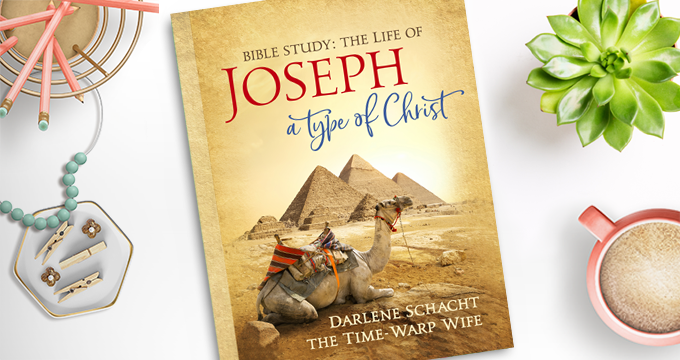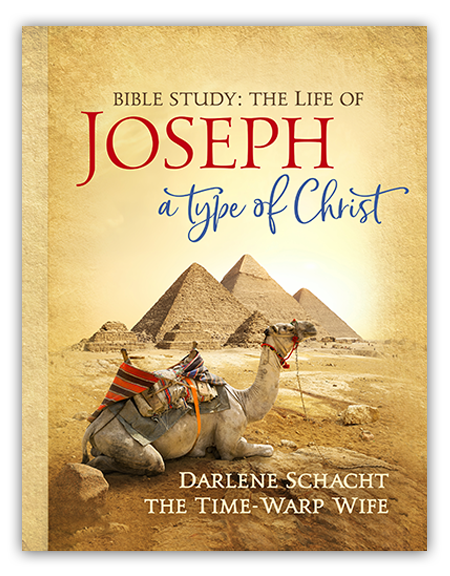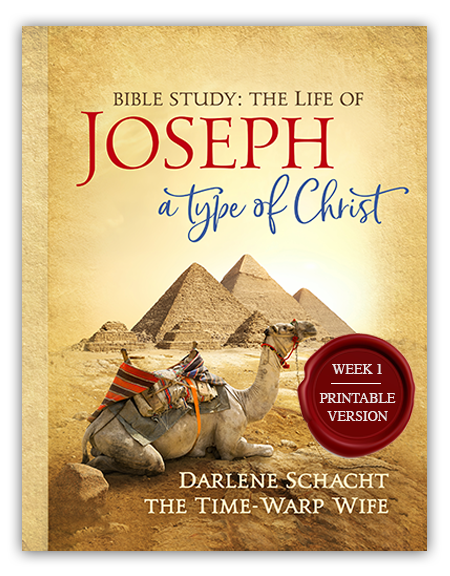
This post contains affiliate links.
Table of Contents:
Introduction to The Life of Joseph
Genesis 37 – The Dangers of Jealousy
Genesis 38 is covered later (found below)
Week 1 Recap and Free Printable
Genesis 39 – Fleeing Temptation
Genesis 40 – Reliance In Suffering
Week 2 Recap and Free Printable
Genesis 42 – God is Using Your Trials
Week 3 Recap and Free Printable
Genesis 43 – To Love The Unloveable
Genesis 44 – A Heart of Repentance
Week 4 Recap and Free Printable
*Genesis 38 – It’s Not Us – It’s All Grace
Genesis 45 – Forgiveness and Grace
Week 5 Recap and Free Printable
Genesis 46 – Seeking God’s Will
Genesis 47 – He’s Not Ashamed to Call Us Brethren
Week 6 Recap and Free Printable
Note to email subscribers: If you have any trouble with the images or links on this page. Click through to the blog at TimeWarpWife.com
If you’re looking for a feel-good journey through faith, Joseph isn’t your guy. He takes everything this world teaches us about forgiveness and grace and turns it upside down in this heart-wrenching account of his life.
The story of Joseph is laced with compassion. Like Christ, he was rejected by men and sold for a few pieces of silver, and like Christ, he was willing to forgive those who hurt him the most.
This Bible-Study takes us on a journey through the life of Joseph. As we journal through this study, we’ll examine several instances where Joseph was a type of Christ and where his life paralleled that of the Messiah. Perhaps this study will be one of history for you—a background on the life of Joseph—or perhaps it will serve as a manual on forgiveness and grace that inspires you to grow in Christ-likeness. My hope is that we will all choose the latter of the two.
John Piper has a short, yet passionate video on the point of the story of Joseph. I encourage you to listen to it before we begin. If you can’t view the video here, hop on over to youtube to watch it: https://www.youtube.com/watch?v=GH7r-0D9vEA
The study is free as each lesson is provided to you week-by-week! It’s also a great study to do with your husband as it’s not exclusive to women.
Option 1:
If you would prefer to pick up a copy of the study guide instead of printing the lessons out, The Life of Joseph: A Type of Christ is available now at Amazon.com. When you purchase a copy of the study guide you’re helping to support this ministry as we share the gospel with over 500,000 women around the world.
Option 2:
Scroll down the page (near the bottom) to find a FREE PDF version of this week’s lesson. Look for the image with the red seal on it. Come back each Tuesday as I’ll be providing the printable lessons week-by week.
* With either option, make sure you come back on Fridays for my thoughts on each lesson.
This series is designed to guide you through a 6-week Bible study experience on the life of Joseph and the many comparisons we find between him and Jesus Christ. It’s also a study that’s rich with life-lessons on forgiveness, grace, and compassion.
As we dig into scripture we’ll focus on the following topics each week.
Note: In addition to the weekly schedule below, I’ll provide you with a free printable each week. This week’s printable will be available on Friday so come back then to find out what it is!
Week 1 (Today)
Introduction Joseph: A Type of Christ
The Dangers of Jealousy
Weekly Recap at Time-Warp Wife.com (March 20, 2020)
Week 2 (Tuesday, March 24, 2020)
Fleeing Temptation
Reliance In Suffering
Weekly Recap at Time-Warp Wife.com (March 27, 2020)
Week 3 (Tuesday, March 31, 2020)
Waiting on God
God is Using Your Trials
Weekly Recap at Time-Warp Wife.com (April 3, 2020)
Week 4 (Tuesday, April 7, 2020)
To Love the Unlovable
The Heart of Repentance
Weekly Recap at Time-Warp Wife.com (April 10, 2020)
Week 5 (Tuesday, April 14, 2020)
It’s Not Us — It’s All Grace
Forgiveness and Grace
Weekly Recap at Time-Warp Wife.com (April 17, 2020)
Week 6 (Tuesday, April 21, 2020)
Seeking God’s Will
He’s Not Ashamed to Call Us Brethren
Weekly Recap at Time-Warp Wife.com (April 24, 2020)
Each week we’ll look at 2 chapters and focus on 2 topics. I’ll provide you with questions to get you digging and thinking a little deeper.
Note: week 1 is an exception to this as we’ll be looking at the introduction and 1 chapter/topic.
Scroll down the page to find the reading assignments and notes for this week, or simply go straight to the Bible study journal below.
On Fridays I’ll post my thoughts on as they pertain to each chapter, so make sure that you come back on Fridays for that. If you would like to share your thoughts on the study, you can do so in the comment section below.
Subscribe so you don’t miss a post, or exciting information on other upcoming Bible studies.
ONLINE RESOURCES:
These are my favourite online Bible study tools!
Bible Gateway – Every version you can imagine is online
Matthew Henry’s Commentary on the Whole Bible
Looking for an easier commentary? Here’s the Concise Version
Other commentaries you might preferInterlinear Bible – I love this one!
Blue Letter Bible – Dig into the Hebrew and Greek
Bible Word Search
Introduction to The Life of Joseph

1 Corinthians 10 teaches us that there is much to learn from Israel’s history. We learn from the prophets that have gone on before us—both the good and the bad. We learn what pleased God and what angered Him. Perhaps most importantly, we see a glimpse of the coming Messiah through the lives of the prophets of old.
These things happened to them as examples and were written down as warnings for us, on whom the culmination of the ages has come. (1 Corinthians 10:11, NIV)
The word “type” comes from the Greek word “tupos” which means a mark or an impression. For example, when printers set type they arrange letters to form words which are then pressed onto paper. What we see on the paper is an imprint of the letters themselves. When I say that Joseph was a “type” of Christ, I’m saying that he resembled Christ in many ways. I’m not saying that he was God by any means. I’m not saying that he was sinless or perfect. What I am saying is that various aspects of his life typified that of the coming Messiah and shone a light on the coming King.
As we go through this study, we’ll examine several instances where Joseph was a type of Christ and where his life paralleled that of the Messiah.
Charles Spurgeon writes,
Joseph is a very eminent type of Christ. When he was hated of his brethren because he protested against their sins, and when they sold him for twenty pieces of silver, he was doubtlessly a portrait of the despised and rejected of men whom his disciple betrayed. Afterwards in his temptations in the house of Potiphar, in the slander and consequent imprisonment in the round house of Pharaoh’s prison, in his after advancement, till he became lord over all the land of Egypt, we clearly see our blessed Lord right well portrayed. Indeed, so well is the picture drawn that there is scarcely a stroke even though it should seem to be a mere accidental incident of the picture which has not its symbolic meaning. You shall read the history of Joseph through twenty times, and yet you shall not have exhausted the type; you shall begin again and find still some fresh likeness between this despised son of Rachel, and the Son of Mary who is also God over all, blessed for ever. Amen.
My original plan was to write a study on the book of Genesis: to start at the very beginning and take you through to the end, but halfway through this wonderful book, I was taken aback by the life of a man who excelled in virtue and strength. One who teaches us that grace isn’t something you earn. A man who shows us that forgiveness isn’t a currency by which we trade tit for tat. A Christ-like servant who exercised compassion and kindness to those who despised him the most. It was then I decided that the life of Joseph should be closely examined in a study all of its own.
It’s often said, “to err is human, to forgive is divine.” It’s so divine in fact, that true forgiveness goes against the grain of humanity. Grace is a hard pill to swallow when one is wounded, rejected, despised… Natural instinct will tell us that one wrong deserves yet another. It leads us to anger, fury and wrath. But the story of Joseph is laced with forgiveness and grace. Like Christ, he was rejected by men and sold for a few pieces of silver, and like Christ he was willing to forgive those who hurt him the most.
Perhaps this study will be one of history for you—a background on the life of Joseph—or perhaps it will serve as a manual on forgiveness and grace that inspires you to grow in Christ-likeness. My hope is that we will all choose the latter of the two.
For everything that was written in the past was written to teach us, so that through the endurance taught in the Scriptures and the encouragement they provide we might have hope. (Romans 15:4, NIV)
The scriptures are written both to teach us and give us hope. Oh, that we might learn to be good forgivers, and to rest in the hope of God’s unfailing grace!
Corrie Ten Boom once said, “If you look at the world, you’ll be distressed. If you look within, you’ll be depressed. If you look at God you’ll be at rest.” Like Joseph, she understood the importance of being grounded in faith. The world is constantly shifting, and people are changing. Those we trust with our hearts, could be the ones that hurt us the most, and so we must learn that peace comes from within.
As you’re going through this study, make sure to read each assigned portion of the Bible first (the corresponding chapter is noted at the top of each lesson in this study). If you aren’t reading the Bible alongside this study a lot of it won’t make sense. On the other hand, if you are reading the Word you’ll definitely get more out of the study than a stand-alone book or online study could ever hope to provide.
Genesis 37 – The Dangers of Jealousy

Read: Genesis Chapter 37
Our study begins with a young boy of 17 tending the flocks with his brothers. We’re told in Verse 3 that Israel loved Joseph more than he loved his other children. Yes, he was born in Jacob’s old age, but we also know from earlier on in scripture that he was the son of Jacob’s favorite wife, Rachel. The Bible tells us that Jacob (Israel) loved Rachel more than his wife Leah. In fact, he was willing to work seven years for her hand in marriage, and when he was deceived by his father-in-law Laban, he worked seven more.
Jealousy was a source of contention in this family, and whether he meant to or not, Israel fed into that envy by openly favoring one of his sons.
Now Israel loved Joseph more than any of his other sons, because he had been born to him in his old age; and he made an ornate robe for him. When his brothers saw that their father loved him more than any of them, they hated him and could not speak a kind word to him. (V.3-4, NIV)
Jealousy, like an infection, will spread when left untreated. Negative thoughts will continue to grow as long as you’re feeding and nurturing them. The solution? Destroy negative thoughts before they consume you. Pluck them out before they have a chance to take root. Cast each one down with an attitude of love and compassion. Be humble enough to accept the fact that others have things that you don’t. Count your own blessings instead of looking over the fence. And finally, always and in every situation, choose love.
One look at the life of Joseph and we see just how destructive this thought pattern can be. Jealousy evolved into hate, which led to a murderous plan when his brothers set out to kill him. But even killing him wasn’t enough as they had little to gain from his death. And so, they stripped him of his ornate robe and sold him for 20 shekels of silver to a group of merchants passing by.
That brings us to the famous colorful coat: was it really a coat of many colors, or was it simply a costly robe? Whether the coat was actually colorful or not is unknown as the Hebrew translation of the original text found in scripture is unclear. One translation says it was colorful, another describes it as an ornate robe. Either way, we know that this coat set him apart from his brothers and reflected Israel’s deep affection for him.
In The Living Torah, Aryeh Kaplan writes,
Kethoneth passim in Hebrew. It was a royal garment; 2 Samuel 13:18 (cf. Ralbag ad loc.). The word passim can be translated as ‘colorful’ (Radak; Septuagint), embroidered (Abraham ibn Ezra; Bahya ibn Paqda; Nachmanides on Exodus 28:2), striped (Jonah ibn Janah; Radak, Sherashim), or with pictures (Targum Jonathan). It can also denote a long garment, coming down to the palms of the hands (Rashbam; Ibn Ezra; Tosafot; Genesis Rabbah 84), and the feet. Alternatively, the word denotes the material out of which the coat was made, which was fine wool (Rashi) or silk (Ibn Janach). Hence, kethoneth passim, may be translated as “a full-sleeved robe”, “a coat of many colors”, “a coat reaching to his feet”, “an ornamented tunic”, “a silk robe”, or “a fine woolen cloak.”
In closing, there are a few things in this chapter that point us directly to Christ—the first being that of Joseph’s coat. We see a similarity in John 19:23-24 as Jesus was also stripped of his clothes before He went to the cross. Fine tunics such as His were costly, which may explain why they stripped Jesus of His coat. The soldiers divided His garments among themselves and cast lots for it.
Again, we see a similarity when Joseph’s brothers killed a goat and dipped his coat in blood. In Revelation we see a picture of Christ returning with His vesture dipped in blood:
And he was clothed with a vesture dipped in blood: and his name is called The Word of God. (Rev. 19:13, NIV)
And finally, as Joseph was sold to the travelling merchants for 20 pieces of silver, we’re reminded of our Savior who was sold for 30 pieces of silver the night He was betrayed.
Pause and Reflect
What warning do we find in James 1:14-15 in regards to evil thoughts and desires?
Consider your own life. Is there any jealousy that you need to address? Are you comparing yourself to others?
Philippians 4:8 gives us advice on keeping our thoughts in check. Write that verse out.
Although Reuben didn’t agree with the plan, he fell short of saving his brother. What does this teach us about standing up for truth?
One way to deal with jealousy is to practice gratitude. Take a moment to list some of your blessings.
In your own words, what does 2 Corinthians 10:5 teach us about controlling negative thoughts?
This Week’s Prayer

Dear Heavenly Father,
It’s natural to compare ourselves to others. It’s easy to fall into the hands of jealousy, envy, and lust when we’re surrounded by picture-perfect lives. All I catch is a glimpse here and there. I don’t see what goes on behind every closed door, but the luster is seemingly perfect. It captures my eyes and turns my attention away from my faith.
Help me to keep from doing that, Lord. Remind me to count my own blessings before I count the blessings of others. Help me to keep my eyes focused on Christ.
Remove any thoughts of jealousy the moment they enter my mind. Teach me to celebrate the success and the opportunities that my friends have been given. Loving without envy, malice, or spite: esteeming others higher than myself.
In the name of Jesus, I pray. Amen.
This Week’s Challenge
Keep your thoughts in check. Meditate on Philippians 4:8, and consciously make an effort to put it into practice.
This Week’s Bible Verse
Finally, brethren, whatsoever things are true, whatsoever things are honest, whatsoever things are just, whatsoever things are pure, whatsoever things are lovely, whatsoever things are of good report; if there be any virtue, and if there be any praise, think on these things. (Philippians 4:8, KJV)
The Life of Joseph: A Type of Christ 6-Week Bible Study Journal available now @Amazon.com
Available now at Amazon.com
When you purchase a copy of the study guide you’re helping to support this ministry as we share the gospel with over 500,000 women around the world.
The Life of Joseph: Printable Version – Week One
Note: This download is only for week 1 of the study. Come back next Monday for part 2. There are six parts in total. Click here to view and download this week’s lesson.
About the Author

Darlene Schacht and her husband Michael live in Manitoba Canada where the summers are beautiful and the winters are cold. Together they’ve come to learn that relationships aren’t always easy, but that marriage, the way God intended it to be, is a treasure worth fighting for.
She began her publishing journey about twelve years ago when she pioneered one of the first online magazines for Christian women, known at the time as “Christian Women Online Magazine.” After three years, Darlene left CWO to blog as a solo author at Time-Warp Wife Ministries.
It was also during this transition that she worked alongside actress Candace Cameron Bure to write the NYT Best-Selling book, Reshaping it All: Motivation for Spiritual and Physical Fitness. Reshaping it All was the winner of both the 2011 USA Best Book Awards and the 2012 Christian Reading Retailers Choice Awards.
Author of more than 15 books, Darlene continues to write and to minister to her readers through her blog at TimeWarpWife.com.
Connect with Darlene:
Facebook: @timewarpwife
Instagram: @timewarpwife
Pinterest: @timewarpwife
Twitter: @timewarpwife
You are loved by an almighty God,
Darlene Schacht
The Time-Warp Wife



